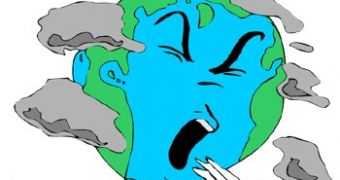A new paper in the journal Climate Change makes a case of how, all things considered, climate change will soon enough lead to a noteworthy increase in the number of premature deaths reported on a global scale each year.
What's interesting is that this increase in the number of untimely deaths will be due to changes in how various air pollutants are distributed across the world.
Dr. Yuanyuan Fang and her fellow researchers explain that, according to several previous studies, climate change will up mortality rates among humans worldwide by impairing food production and making it easier for vector-borne diseases to spread.
What's more, it will foster extreme weather manifestations, and it will translate into a considerable increase in global sea levels.
By the looks of it, climate change will also toy with the regional concentrations of air pollutants such as ozone and fine particulate matter, i.e. black carbon, sulphate, fine dust particles and nitrate.
All these pollutants are known to up the risks of lung cancer and several other respiratory or cardiovascular conditions, Science Daily reports.
Computer models have shown that, in the years to come, climate change has high chances to increase concentrations of fine particulate matter over East Asia, South Asia and North America.
Besides, it could boost the levels of ozone over the northeastern regions of the United States, the same source tells us.
Dr. Yuanyuan Fang and her colleagues theorize that, all things considered, this worsening of global air pollution will increase the current number of premature deaths reported worldwide on a yearly basis by as much as 100,000.
Otherwise put, 100,000 more people will be killed by medical conditions linked to various air pollutants.
Some 6,300 of these deaths will be caused by ozone inhalation. Fine particulate matter will have to be blamed for the remainder.
Commenting on these findings, Prof. Denise Mauzerall pointed out that, “This climate penalty indicates that stronger emission controls will be needed in the future simply to meet current air quality standards and to avoid higher health risks associated with the worsening of air quality as a result of climate change.”

 14 DAY TRIAL //
14 DAY TRIAL //